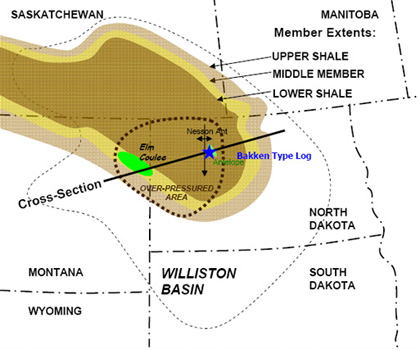Balkin' at Bakken
The clean technology industry has no cause, apparently, to be rattled by reports of vast amounts of new recoverable oil in North America, threatening to undermine the economics of renewable energy.
No, the peak oil crowd—despite their, our and the rest of the world’s wishes to the contrary—looks vindicated: we appear to still be running out of oil at a worrisome rate, with no magic reserves.
Two latest datapoints:
495.7 billion barrells short
New findings from the U.S. Geologic Survey (USGS), released last week, suggest the oil reserves of North America’s Bakken geologic formation, lying under North Dakota, Montana, Manitoba, Saskatchewan and Alberta, only represent between 3.0 to 4.3 billion barrels of recoverable oil in the immediate term.
This is significant, given that estimates of the amount of oil in the Bakken formation had varied wildly, with estimates of up to 500 billion barrels touted optimistically.
The higher estimate was from a study by Leigh Price, a USGS geologist who died in 2000 before his study was formally published.
[Conspiracy theorists take note: Price’s friend Tresa L. Kosnar, reached today by Cleantech.com, noted that Price, by then in his early 50s, died from a massive "unexpected and strange" coronary arrest while working out in his home. Notwithstanding that active people do sometimes die from heart attacks, Price was in great physical condition, she said, noting he spent a great deal of time riding his bike, lifting weights and running. But we digress.]
Some had worried that the possibility of 500 billion barrels of oil in Bakken would undermine clean technology investment and innovation, as it would represent approximately double what Saudi Arabia is said to have remaining.
"Peak oil? What peak?!" went the reasoning, if North America is indeed sitting on twice as much oil as the Saudis.

Unlike this one, most American maps of the Bakken Formation end at the U.S. border. Perhaps the Canadians can get more out?
The latest USGS report only points to as much as 4.3 billion barrels accessible with today’s technology. That’s a far cry from 500 billion barrels, but is still a 25-fold increase over the agency’s 1995 estimate of 151 million barrels, and is therefore an increase of some 6 percent in the total U.S. national recoverable oil estimates. Further oil technology innovation could potentially unlock more of the reserve, experts say, but at significant cost.
Getting at the Bakken oil is apparently expensive and difficult, and potentially as damaging to the surrounding landscape and environment as the Alberta oil sands projects, they say.
Drilling must be done down, and then horizontally, through rock, which has to be fractured with pressurized fluid and sand to release the oil tucked away in microscopic pores. So it’s about as intensive to get to as the oil locked away in the sands of Alberta.
Russia now at peak production?
Another datapoint supporting the peakists: Russian officials have started to assert that oil production in Russia, after growing 58 percent in the last 10 years, is now declining.
Russian Natural Resources Minister Yuri Trutnev made an ominous admission in televised remarks after a government meeting two weeks ago:
"Now we’re saying the production rate is falling this year. This is not a bogeyman, unfortunately, this is real,” Trutnev said. Days later, Alfa Bank and Credit Suisse both also confirmed the decline.
Russia currently supplies approximately 11 percent of the world’s oil.
Oil production in Mexico, Norway, The United Kingdom and the North Sea and elsewhere is already in decline, according to U.S. Department of Energy figures. Next up: Saudi Arabia?
Say what you will about the science of peak oil, or its exact timing. And no, there still isn’t very good integration of the peak oil and cleantech communities; the two groups don’t talk much to each other. But these latest developments underscore that it seems a safe bet to heed the peakists and continue to plan for overall oil decline as a driver of cleantech policy, innovation and adoption.
Dallas Kachan is one of the managing directors of the Cleantech Group, and is acting editor of its media publications, including Cleantech.com and Inside Cleantech.You can return to the main Market News page, or press the Back button on your browser.

